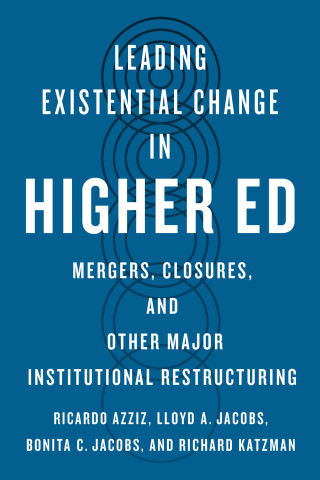
Books

Leading Existential Change in Higher Ed
Mergers, Closures, and Other Major Institutional Restructuring
Ricardo Azziz, Lloyd A. Jacobs, Bonita C. Jacobs, and Richard Katzman
Johns Hopkins University Press
Publication Date, October 28, 2025
A guide on how to strategically lead institutions of higher education through mergers and other major institutional restructurings.
Higher education is at a crossroads. With demographic shifts, financial constraints, shrinking enrollments, and the demand for institutional innovation, universities and colleges are grappling with monumental challenges. In Leading Existential Change in Higher Ed, Ricardo Azziz, Lloyd A. Jacobs, Bonita C. Jacobs, and Richard Katzman offer invaluable insights into how institutional leaders can successfully navigate mergers, closures, and other large-scale transformations.
Read What Others Are Saying
The authors explore the critical components of successfully leading institutional restructuring—such as pacing change, managing resistance, and harnessing the power of early adopters—while also recognizing the obstacles leaders face. Using vivid examples from real mergers in higher education, this book demonstrates how and why versatile leadership is essential as colleges and universities face an increasingly uncertain future. Whether managing a complex merger, preparing for potential closure, or undertaking other major institutional restructuring, leaders must be willing to embrace difficult decisions and act decisively before institutional decline becomes irreversible.
Drawing on decades of leadership experience and research, this book provides actionable strategies for higher education leaders to take charge of change, rather than be swept away by it. Leading Existential Change in Higher Ed is an essential guide for college and university presidents and chancellors, trustees, policymakers, and other executives and stakeholders who seek to lead and guide institutions of higher education through turbulent times.How proactive higher education mergers can stabilize and enhance colleges and universities—and ensure their future.*
With the pool of high school graduates decreasing, national and global competition increasing, and the need to invest in new technologies and approaches growing, many universities and small colleges alike are struggling—not just to thrive, but to survive. In this challenging environment, mergers and consolidations are often viewed as options of last resort. Strategic Mergers in Higher Education, however, argues that college and university mergers are a legitimate and proactive strategic option to help ensure success, maximize quality and service, and yield the best return for faculty and students.
In this thoughtful book, Ricardo Azziz and his coauthors—including higher education leaders who have led successful consolidations—address the many questions surrounding institutional mergers. When, they ask—and why—should a merger be considered? How can leaders deal effectively with the many challenges and opposition that a merger will inevitably face? What are the predictors of failure and success in higher education mergers? And how do we successfully address the postmerger cultural divide?
This thorough text demonstrates how mergers can dramatically accelerate the goals of postsecondary institutions. The book is informed by an extensive review of published reports, interviews with over thirty higher education leaders, individual case studies, and the experiences of the authors themselves.
Addressing numerous critical questions, this practical guide is aimed at higher education leaders and their boards, the campus leaders charged with executing transformative mergers, and any policy makers interested in change management or the future of higher education.
*From the Johns Hopkins University Press

Strategic Mergers In Higher Education
Ricardo Azziz, Guilbert C. Hentschke, Lloyd A. Jacobs, and Bonita C. Jacobs
Johns Hopkins University Press
Publication Date, October 29, 2019
How proactive higher education mergers can stabilize and enhance colleges and universities—and ensure their future.*
With the pool of high school graduates decreasing, national and global competition increasing, and the need to invest in new technologies and approaches growing, many universities and small colleges alike are struggling—not just to thrive, but to survive. In this challenging environment, mergers and consolidations are often viewed as options of last resort. Strategic Mergers in Higher Education, however, argues that college and university mergers are a legitimate and proactive strategic option to help ensure success, maximize quality and service, and yield the best return for faculty and students.
In this thoughtful book, Ricardo Azziz and his coauthors—including higher education leaders who have led successful consolidations—address the many questions surrounding institutional mergers. When, they ask—and why—should a merger be considered? How can leaders deal effectively with the many challenges and opposition that a merger will inevitably face? What are the predictors of failure and success in higher education mergers? And how do we successfully address the postmerger cultural divide?
This thorough text demonstrates how mergers can dramatically accelerate the goals of postsecondary institutions. The book is informed by an extensive review of published reports, interviews with over thirty higher education leaders, individual case studies, and the experiences of the authors themselves.
Addressing numerous critical questions, this practical guide is aimed at higher education leaders and their boards, the campus leaders charged with executing transformative mergers, and any policy makers interested in change management or the future of higher education.
*From the Johns Hopkins University Press
